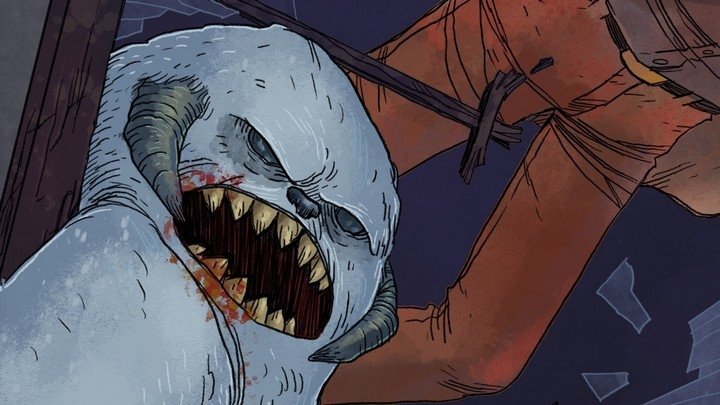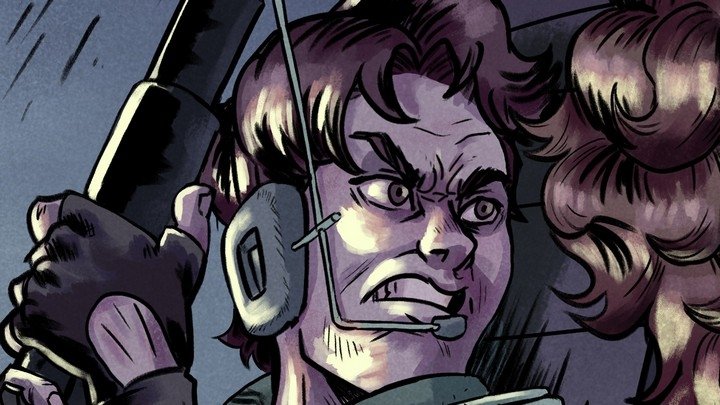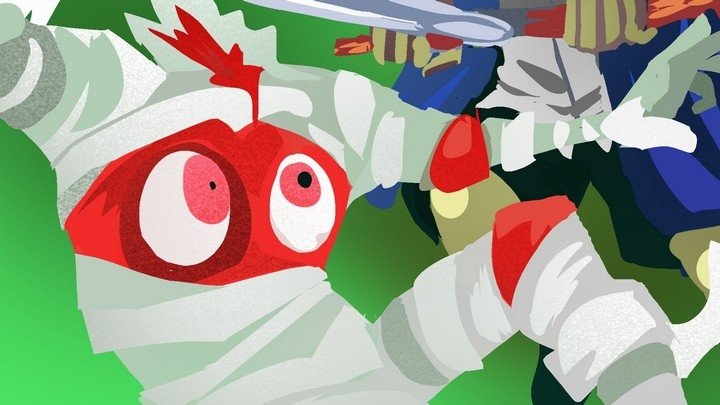With The Mummy: Demastered, WayForward hews a little too closely to 8-bit roots
An intriguing game bogged down by design conventions we've abandoned for a reason.
As with many games produced by the plucky upstarts at WayForward, The Mummy Demastered takes a somewhat questionable license and applies vintage game aesthetics to it with far more love and craftsmanship than the property necessarily deserves. In this case, the license comes from this summer's attempt to reboot The Mummy by replacing Brendan Frasier with Tom Cruise, thereby building a foundation for an Avengers-esque cinematic universe packed with Universal monster characters and Dr. Jeckyl playing the role of Nick Fury. The film may have left critics and moviegoers feeling like someone stuffer their brains into a canopic jar, but the game has more going for it… despite some notable issues.
Rather than looking to Marvel movies for inspiration, WayForward instead turned to their most comfortable niche for Demastered: 16-bit-style metroidvania action. It's not the most original concept, but it works well enough… in large part because the game takes place independently of the film, dropping players into the role of anonymous soldiers working for the Illuminati-like Prodigium agency rather than casting them as Tom Cruise's movie protagonist. You control, effectively, the anonymous soldiers in the background of the film battles, the ones who die hopelessly while the hero goes about heroing. As in the studio's excellent Aliens: Infestation for DS, you play as a single agent at a time, and there's no game over screen upon death; instead, the action maintains a thread of continuity even when you fail. In this case, your agent is replaced by another balaclava-clad gunman, who rappels into the save room you've used most recently to take the place of the downed warrior.

Cleverly, the game plays up the film's central premise of a battle against the undead by applying a mechanical twist to the concept of death. Unlike in, say, Crackdown, a downed agent doesn't simply vanish from memory; instead, he becomes possessed by the ancient Egyptian powers you're fighting against. The corpse of a failed outing revives as a revenant patrolling the spaces near where you fell, carrying all the equipment you died carrying. In order to reclaim your lost gear, you have to fight the heavily armed specter of your former life. It's like returning to claim the souls or equipment you dropped where you fell in Dark Souls or EverQuest, except here the loot you left behind has teeth (or rather, grenades and high-powered rifles).
These undead agents help add a distinct touch of personality to what would otherwise be a fairly standard metroidvania platformer. They take the zombie-movie horror of being forced to fight the shade of a fallen friend or ally and transform it into a dynamic play mechanic. Battling a boss comes hand-in-hand with the understanding that if you blow it, you'll have to fight the boss again… and you'll also have to take down your own wraith in order to reequip yourself with all the health boosts and high-powered weapons you'd been carrying.
Sadly, as much as I enjoy this concept in the abstract, Demastered suffers from one specific trait that makes these zombie battles — along with the rest of the game — far more frustrating than it really needs to be. WayForward has created a melting pot pastiche of ideas from tons of other great games ranging from Contra to Halo to the latter-day Castlevania adventures… but in several critical respects, it skews a little too heavily toward 8-bit game design. There's nothing inherently wrong with 8-bit games, but in this case some of the mechanics in play are things their creators abandoned and hammered into better shape years ago for good reason.

For one, The Mummy Demastered makes extensive use of infinitely spawning monsters that fly in constantly from the sides of the screen. These take a few different forms, including crows drifting in a gentle sine wave pattern (a Castlevania medusa head reference that feels explicit even before you get to the clock tower full of spinning gears) and flying enemies that rise to the player's level and make a beeline toward him (like the pipes full of bee creatures in Metroid). The idea of infinite waves of enemies is fine, but the games that Demastered references so adeptly use them sparingly — especially in their more recent entries. Here, however, they show up constantly; it feels like about half the rooms in the game have some sort of perpetual spawn to deal with. These creatures have a tendency to appear at ill-advised times. The game loves to cause zombies to emerge from the ground beneath your feet when you least expect it. Flying spawns like crows and bats seem to show up most frequently in areas where you ascend tiny platforms, streaking in from off-screen while you're in mid-leap to interrupt your jump and send you plummeting back to where you came from.
To make things even more frustrating, enemies — whether instanced or infinite — tend to hit incredibly hard. That in itself isn't necessarily a bad thing, but the game's miserly approach to energy restoration turns every single bump or scrape into a tedious setback. Aside from dying or gathering one of the handful of energy expansion pickups located throughout the game, Demastered never gives you any means by which to quickly refill your health. Instead, it uses a Metroid-style system in which you recharge by collecting energy drops left behind when you destroy a monster.

As in Metroid, enemies drop both health refills and ammunition for your expendable subweapons. Unfortunately, Demastered does not make use of the system Nintendo implemented beginning with Super Metroid, where enemies only drop icons for elements that need to be refilled; here, you'll continue to see grenade and ammo refills even if your subweapons are at max capacity. And when health pickups do appear, they usually only recharge 5 hit points (the larger 20-point drops show up far less frequently). The net result of these factors means that once you've expanded your health capacity to 400 or 500 HP, recharging back to max capacity can take ages. Taking a hit from a respawning monster that dings you for 25 or 30 HP can mean you'll spend as much as a minute of grinding through useless ammo drops just to replenish that lost energy.
While these may seem like fairly fine-hair nitpicks, Demastered's hostile design choices add up over time. They really come to a head late in the game as you ascend the aforementioned clock tower, where infinite crows fly onto the screen while you're trying to navigate spinning cogwheels, bounce across elevator platforms and rotating gears, and dodge instanced foes who throw powerful boomerangs. It's bad enough that these scenarios are almost impossible to navigate unscathed, but on top of that a single misstep will send you plummeting to the bottom of the tower, where you'll be forced to start the zig-zag climb all over again… but this time with less health than before. It brings to mind the complaints we raised about Super Mario Sunshine in our recent podcast deep-dive into that game, and it creates the impression of a game that lacks respect for the player's time. There's a tricky line between challenge and tedium, and Demastered frequently comes down on the wrong side of it.
I hate that Demastered falls victim to these thousand papercuts, because otherwise it's a lovely game. The music drips with atmosphere, and the pixel-based art does a great job of rendering modern-day London under siege by the supernatural. The graphics will unsurprisingly remind you of some of the DS Castlevania games, especially Portrait of Ruin (which also contained both Egyptian and 20th century London-themed stages). But while it looks like Castlevania, the paramilitary run-and-gun action falls somewhere between Metroid and Contra. Prodigium agents are neither as agile as Contra's heroes nor as tank-like as Samus Aran, but they split the difference well, and the Halo-style "two guns and a grenade" gear system ties in neatly to the zombie-agent mechanic.
Perhaps most importantly, the overall world design works wonderfully. The subways and sewers beneath the streets of modern London interconnect in thoughtful ways. Every area is thick with ledges too high to reach or doors too durable to break through the first time you spot them, demanding you return once you've powered up a bit. It really tickles the obsessive-compulsive core of the brain — the drive to fill in all those darkened-out spots you haven't explored yet on the map cannot be denied! — and the overall flow of the catacombs feels good. Add to that the danger that failure means a powerful boss-tier enemy version of yourself to deal with near where you fell and you have the basis of a great game.

These successes only make Demastered's mechanical inconveniences all the more disappointing. The game comes so close to being a must-play retro platformer, yet its tendency to skew a little too retro for its own good can become suffocating. The hassles of dealing with all those endless enemies at inopportune times and grinding for health pickups often turns this into that most heartbreaking of game creations: An exploratory game in which exploration devolves into a joyless slog. (It didn't help that I played Demastered in its Switch incarnation, which suffers from slowdown and choppiness significant enough to interfere with the action — an issue I didn't notice in the Windows version of the game.)
Despite these flaws, I see far more potential in Demastered than in the film it's based on. I don't know if Universal plans to build on the cinematic universe they launched to such widespread disinterest this summer, but I would love to see more adventures in this vein by this team. Both the overall design and high-level concepts at work in Demastered serve as the foundation for an excellent game, but the fine details trip it up. I feel the game's problem could largely be resolved with a different arrangement of enemies and a few tweaks to health mechanics — something beyond the scope of a patch for a licensed game, perhaps, but easily addressed in a future game. As it is, Demastered reminds me a lot of WayForward's breakout work, the original Shantae: Compelling, creative, and undermined by a few critical balancing issues. Shantae has risen above its bumpy Game Boy Color origins, and there's no reason future Demastered games (whether or not they wear the Universal license) couldn't do the same. In the here and now, though, The Mummy Demastered offers much to recommend it… provided you have a high tolerance for grinding and frustration.




